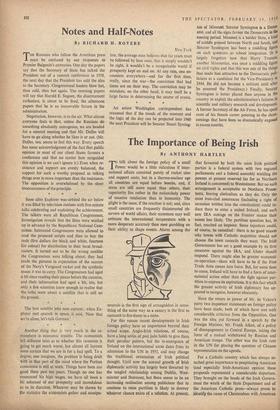Notes and Half-Notes
By RICHARD H. ROVERE THE Russians who follow the American press must be confused by our responses to Premier Bulganin's entreaties. One day the papers say that the Secretary of State has talked the President out of a summit conference in 1958, the next day that the President has sold the idea to the Secretary. Congressional leaders blow hot, then cold, then hot again. The morning papers will say that Harold E. Stassen, the disarmament enthusiast, is about to be fired, the afternoon papers that he is an immovable fixture in the administration.
Negotiation, however, is in the air. What almost everyone feels is that, unless the Russians do something absolutely outrageous, we are headed for a summit meeting and that Mr. Dulles will have to go along whether he likes it or not. (Mr. Dulles, too, seems to feel this way. Every speech has some acknowledgment of the fact that public opinion in most of our client States favours a conference and that no matter how misguided this opinion is we can't ignore it.) Even when re- sistance and support are evenly balanced, the support for such a worthy proposal as talking things over is more important than the resistance. The opposition is overwhelmed by the sheer innocuousness of the principle.
Soon after Explorer was orbited the air below it was filled by television stations with five-minute talks celebrating and explaining the achievement. The talkers were all Republican Congressmen. Investigation reveals that the films were worked up in advance by the Republican National Com- mittee. Interested Congressmen were allowed to read the prepared scripts and then to buy the reels (five dollars for black and white, fourteen for colour) for distribution to their local broad- casters. It turned out to be the wrong satellite the Congressmen were talking about; they had made the pictures in expectation of the success of the Navy's Vanguard rocket and the synthetic moon it was to carry. The Congressmen had aged a bit since reading their pieces before the cameras, and their information had aged a bit, too, but only a few scientists knew enough to realise that the talks were about a satellite that is still on the ground.
* * *
The best satellite joke now ,current : when Ex- plorer met sputnik in space, it said, 'Now that we're alone, let's talk German.'
* Another thing that is very much in the at- mosphere is economic trouble. The economists tell different tales as to whether this recession is going to get much worse, but almost all laymen seem certain that we are in for a bad spell. To a degree, one imagines, the problem is being dealt with in that part of the mind where the Puritan conscience is still at work. Things have been too good these past ten years. Though no one has renounced his high wages, we have all been a bit ashamed of our prosperity and incredulous as to its duration. Whatever may be shown by the statistics the economists gather and manipu- New York late, the average man believes that fat years must be followed by lean ones, that it simply wouldn't be right, it wouldn't be a recognisable world if prosperity kept on and on. At any rate, one en- counters everywhere—and for the first time, really, since the war—the conviction that bad times are on their way. The conviction may be mistaken; on the other hand, it may itself be a large factor in determining the course of events.
An astute Washington correspondent has reasoned that if the trends of the moment and the logic of the day can be projected into 1960 the next President will be Senator Stuart Syming- ton of Missouri. Senator Symington is a Dann' crat, and all the signs favour the Democrats in the coming period. Missouri is a border State, a kind of middle ground between North and South, and Senator Symington has been a middling figure on such questions as school integration. (It is largely forgotten now that Harry Truman, another Missourian, was once a middling figure on civil rights and that this was one of the things that made him attractive to the Democratic poli- ticians as a candidate for the Vice-Presidency in 1944. He did not become a militant until after he assumed the Presidency.) Finally, Senator Symington is better placed than anyone in the country to exploit the administration's failures in scientific and military research and development. A former Secretary of the Air Force, he has spent most of his Senate career pointing to the short- comings that have been so dramatically exposed in recent months.






























 Previous page
Previous page